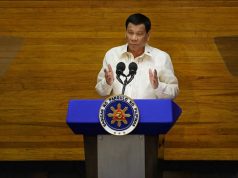Some social media users noticed that the satirical account “Malacañang Events and Catering Services” is no longer maintaining an online presence as early as last month.
Both its Facebook and Twitter profiles were found to be inactive or removed from the platforms. What has been left are notifications indicating the accounts have been removed or reported.

Its Twitter page under the handle @MalacananEvents is also nonexistent, according to its records.

Some social media users, including award-winning director Kip Oebanda, speculate that Facebook shut it down while others claimed that it might have been “mass reported.”
Administration critics claimed that the account might have been temporarily “deactivated” or “taken over by Chinese trolls.”
Content versus government
Last month, Rep. Ron Salo (Kabayan party-list), who chairs the House of Representatives’ public information committee, urged Congress to investigate social media accounts supposedly spreading fake news about the Southeast Asian Games hosting of the country.
He particularly named “Malacañang Events and Catering Services,” “Pinoy Ako Blog” and “Silent No More PH” as among that were allegedly behind the so-called smear campaign.
“The hashtag is #SEAgamesfail, so what does that mean? So basically, there appears to be really that this organized group behind it trying to ensure that what they want to achieve for this, for SEA games to fail,” Salo said, as quoted by reports.
House Speaker Alan Cayetano, the head of the SEA Games organizing committee, also backed the initiative and even said that they “found the digital footprint” of those spreading reports against the organizers.
“It’s a political group that’s behind those Facebook pages and websites. So those people behind, as well as their PR (public relations) man, should prepare because they will be invited in the investigation,” he said.

During the preparations up to the early days of the biennial multi-sport event from November 30 to December 11, verified reports on unfinished venues, logistical failures on athletes’ accommodations and low-quality food surfaced.
Despite stemming from what transpired on the ground, online mobs tried to dispel the reports and called them false.
“Malacañang Events and Catering Services” was one of those that shared satirical content about the country’s hosting care of the Cayetano-led SEA Games Organizing Committee.
This is not the first time that the parody account has caught the attention of public officials.
Last May, presidential spokesperson Salvador Panelo accused the account of “political mudslinging” and spreading “black propaganda” after it shared a meme of him with senatorial candidates from the opposition.
The account surfaced after presidential granddaughter Isabelle Duterte held her pre-debut pictorial within Malacañang Palace. It received meme treatment from the page following various reactions from social media users.
Protected speech
Satire is protected speech under the 1987 Constitution, based on a 2015 ruling of the Supreme Court.
Merriam-Webster also defines it as a form of expression that intends to “arouse amusement” by exposing or ridiculing conduct, doctrines or institutions by direct criticism or through irony, parody or caricature.
A professor of communication at the University of Delaware shared that satire has been used as an effective way to expose “hypocrisy and flaws” to the public.
“Satirists like Aristophanes writing in ancient Greece used rich political satire and irony to expose hypocrisy and flaws among elites and within policies and institutions,” Dannagal Young said.
“In reality, humor has always had a very natural place in politics, particularly in democratic regimes where elected officials are accountable for their actions and citizens look at them with a critical eye,” Young added.
The Philippine Constitution also upholds freedom of speech and expression, specifically under Section 4 of the Bill of Rights where it states that no law shall be passed abridging the freedom of speech, of expression or of the press.










